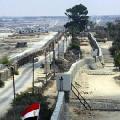
For the building of movements and the intensification of activities to bring down the ‘Rafah wall’ – organisation of workers and the poor is the only true solidarity
The construction of the wall on the Rafah border, between Egypt and Gaza aimed at maintaining the siege on Gaza and furthering the oppression of the Palestinians, illustrates the basic role played by the regional Arab rulers, especially the Mubarak regime in Egypt, which aims to sustain its political influence and line in the Middle East.
The so-called "moderate" regimes also participate in the development of neo-liberal global capitalism, which is responsible for supporting the brutal and racist Israeli regime, in expanding its occupation and in prohibiting Gaza residents to rebuild their homes (destroyed in the recent Israeli military attacks), and putting pressure on Hamas in the current regional negotiations. The already impoverished Palestinian people of Gaza are paying a high price for these brutal policies, unable to secure essential materials and suffering from 80% unemployment, with no means of self-defense, or “determining” their own fate.
Rafah border wall, maintaining siege of Gaza
Unlike the corrupt and pro-Western leadership of Abbas and Fatah, Hamas still enjoys broad support among the Palestinians despite the fact that this support has been reduced. But Hamas does not give the masses of Gaza democratic rights and does not provide an alternative to war, poverty and occupation. It is not prepared to challenge ‘Arab’ capitalism, which has failed to defend the rights of the Palestinians, and which has impoverished populations throughout the region, as is evident throughout the Arab world. And now, in the absence of any strategy to build a broad movement in Gaza, and to unite the masses of the region for the removal of the blockade and to break the wall, Hamas has resorted to negotiation with the imperialist powers.
What is needed is an independent mass workers’ movement in Palestine, the Arab world, and internationally, free from the chains of local rulers and imperialism in the region, and not limited by religious or national ideologies and divisions and, able to link up in solidarity with working people who are not represented by the rulers.
Abbas’ image, in the opinion of the Palestinians, has been damaged due to his subjugation to Israel and the United States. The Arab regimes have betrayed the hopes of the Palestinian and Arab masses. When Mubarak began to close the Rafah crossing, it became clear to the masses that he had been co-operating with Israel since the start of the siege imposed on the Gaza Strip. But like other mainstream party leaders, he is leaning on the ‘national security’ question and on spreading fear, and like other leaders, exploits sectarianism to stay in power. In this, he intends to benefit from the war and occupation, while limiting the risk of uprisings and class unity, and continuing with capitalist economic policies in the “New Middle East”.
These policies allow right-wing and far-right forces to grow, instead of a mass workers’ movement, along the lines of the first Palestinian Intifada (a mass uprising of the Palestinian masses in 1987), and allow the far-right in Israel and supporters of the Israeli state internationally to continue their attacks on Palestinian land and lives. There is no other alternative than the building of independent mass workers’ parties in the region and internationally, through which activists can be organised and the building of a movement which can open the Rafah border and face up to repressive governments. Such a movement can appeal to workers across all divisions to join the struggle, uniting workers in struggle for the liberation of Palestine and for the building of a workers’ international to fight for a socialist alternative to the rotten capitalist system.
Special financial appeal to all readers of socialistworld.net |
Support building alternative socialist media Socialistworld.net provides a unique analysis and perspective of world events. Socialistworld.net also plays a crucial role in building the struggle for socialism across all continents. Capitalism has failed! Assist us to build the fight-back and prepare for the stormy period of class struggles ahead. Please make a donation to help us reach more readers and to widen our socialist campaigning work across the world. |
Donate via Paypal |
| M | T | W | T | F | S | S |
|---|---|---|---|---|---|---|
| 1 | 2 | 3 | ||||
| 4 | 5 | 6 | 7 | 8 | 9 | 10 |
| 11 | 12 | 13 | 14 | 15 | 16 | 17 |
| 18 | 19 | 20 | 21 | 22 | 23 | 24 |
| 25 | 26 | 27 | 28 | 29 | 30 | 31 |


Be the first to comment